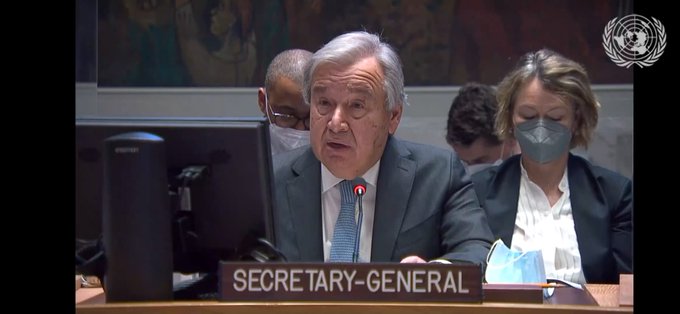Finally, there is a faint ray of hope that diplomacy is asserting itself towards ending the conflict between Ukraine and Russia.
For the first time after fighting began towards the end of February, all members of the UN Security Council, including Russia and the United States, were on the same page—endorsing the UN Secretary General’s initiative to find a peaceful end to the crisis in Ukraine.
“The Security Council expresses strong support for the efforts of the secretary-general in the search for a peaceful solution,” said the UN statement,
Antonio Guterres, the UN Secretary General, had visited Moscow as well as Kiev in late April. His efforts have yielded two evacuations of civilians from the besieged Azovstal factory in Mariupol, where “Azov” militants loyal to the government in Kiev and other Ukrainian fighters have been trapped.
The rare show of unity comes at a time when the fallout of the crisis in Ukraine becomes clearer. It is now likely that hunger may stalk large parts of the world as the conflict in Ukraine disrupts food supply from the Black Sea area—a major centre of world food production, especially wheat and maize. The “crippling” sanctions against Russia are also likely to derail world energy supplies, as Moscow is the largest producer of oil in the world.
There is also a threat that any prolongation of the conflict, and its possible escalation, will mutate into a major international peace and security crisis, bringing use of nuclear weapons and a third world war on the horizon.
Russia’s support for the statement, drafted by Mexico and Norway, shows Moscow’s readiness for diplomacy, Mexico’s permanent representative the UN Juan Ramón de la Fuente Ramírez was quoted as saying by TASS.
But diplomacy, if it gathers momentum, will have to reconcile very basic differences. Russia wants Ukraine to adopt the doctrine of “neutrality”—in other words a solemn and verifiable pledge that Kiev will not join NATO. But in return, to ensure Ukraine’s neutrality, Kiev can be expected to demand iron-clad security guarantees—a task that will be hard to accomplish.
Picking up the pieces from the broken Minsk accord of , which would have allowed the Donbass region, the eye of the conflict, autonomy within the boundaries of the Ukrainian state will also prove exceptionally difficult. Russia has already recognised the independence of Donetsk and Luhansk—two territories that comprise Donbass. By changing facts on the ground and designating them as independent states, it appears unlikely that the framework of the Minsk accord will be valid any longer.
Also View: Ukraine-Russia crisis: What is the Minsk agreement?




















